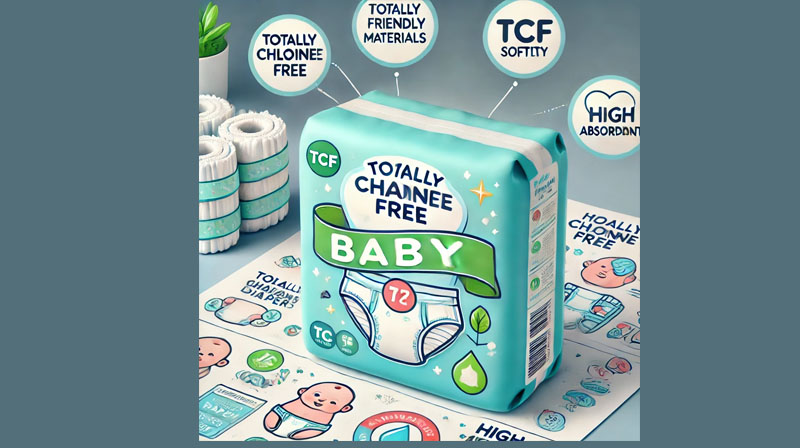Are Healthy Baby Diapers TCF (Totally Chlorine Free)? A Comprehensive Guide
When it comes to selecting the best diapers for their babies, parents are increasingly concerned about the environmental impact and safety of the products they use. One important factor in this decision is whether the diapers are TCF, or Totally Chlorine Free. This blog aims to explore what TCF means, the benefits of using TCF diapers, and whether Healthy Baby Diapers fit this category.

Understanding TCF: Totally Chlorine Free
What Does TCF Mean?
TCF stands for Totally Chlorine Free. This term is used to describe products, particularly paper products like diapers, that are bleached without the use of chlorine or its derivatives. Traditional bleaching processes often use chlorine gas, which can release harmful by-products like dioxins into the environment. TCF bleaching, on the other hand, uses alternative methods such as oxygen, ozone, or hydrogen peroxide.
Why is Chlorine Used in Diapers?
Chlorine bleaching has been a common practice because it effectively whitens and sanitizes the pulp used in diaper production. However, the process can produce dioxins, which are environmental pollutants that have been linked to various health issues, including cancer and reproductive problems.
Benefits of TCF Diapers
- Environmental Impact: TCF diapers reduce the release of harmful dioxins into the environment, making them a more eco-friendly option.
- Health and Safety: By eliminating chlorine and its by-products, TCF diapers are considered safer for a baby’s sensitive skin. They reduce the risk of chemical exposure, which can lead to skin irritation or other health concerns.
- Sustainability: TCF processes often align with sustainable forestry practices, ensuring that the raw materials used are sourced responsibly.
Healthy Baby Diapers: An Overview
Brand Philosophy
Healthy Baby Diapers is a brand that emphasizes safety, health, and environmental responsibility. They claim to provide diapers that are free from harmful chemicals and made with sustainable materials. Their mission is to offer parents peace of mind by ensuring that their products are safe for babies and kind to the planet.
Ingredients and Materials
Healthy Baby Diapers use a variety of natural and safe materials in their products. These typically include sustainably sourced wood pulp, plant-based materials, and non-toxic adhesives. The brand highlights its commitment to avoiding harmful substances such as fragrances, lotions, latex, and chlorine.
Certifications and Standards
The brand often boasts certifications from environmental and health organizations, which can include:
- FSC (Forest Stewardship Council): Ensures the pulp used is sourced from responsibly managed forests.
- OEKO-TEX Standard 100: Indicates that the diapers are free from harmful substances.
- Dermatologically Tested: Ensures the diapers are gentle on sensitive skin.
Are Healthy Baby Diapers TCF?
Research and Claims
To determine whether Healthy Baby Diapers are TCF, it is important to review the brand’s claims and available product information. Healthy Baby Diapers prominently markets their commitment to avoiding chlorine in their products, which suggests they may be using TCF methods.
Packaging and Labeling
Parents should look for specific labeling on the packaging that indicates the diapers are TCF. Terms like “Totally Chlorine Free” or certifications from environmental organizations that verify the absence of chlorine bleaching can provide assurance.
Customer Reviews and Feedback
Customer reviews and feedback can also be a valuable source of information. Many parents who are environmentally conscious and health-focused will share their experiences and findings, providing insight into whether Healthy Baby Diapers meet TCF standards.
Third-Party Testing and Reports
In some cases, third-party testing and reports can offer definitive proof of a product’s TCF status. These independent evaluations can confirm whether Healthy Baby Diapers use TCF bleaching processes and adhere to other safety and environmental standards.
Benefits of Choosing TCF Diapers
Reduced Risk of Allergies and Irritations
TCF diapers minimize the risk of skin allergies and irritations caused by chlorine and its by-products. Babies have delicate skin, and reducing chemical exposure is crucial for preventing rashes and discomfort.
Supporting Environmental Health
By choosing TCF diapers, parents contribute to reducing the release of harmful dioxins into the environment. This choice supports cleaner water, soil, and air, promoting a healthier planet for future generations.
Aligning with Sustainable Practices
Many TCF diaper brands, including Healthy Baby Diapers, prioritize sustainable practices. This includes sourcing materials responsibly and minimizing the environmental impact of their manufacturing processes.
Practical Tips for Parents
Reading Labels and Researching Brands
Parents should take the time to read labels carefully and research brands before making a purchase. Understanding the terminology and certifications can help in identifying truly TCF products.
Trial and Error
Finding the right diaper for a baby can involve some trial and error. Parents may need to try a few different brands to determine which one fits best, offers the best absorbency, and aligns with their environmental and health priorities.
Considering Cost and Availability
While TCF diapers may sometimes be more expensive, the benefits they offer in terms of health and environmental impact can justify the cost. Parents should also consider the availability of these diapers and whether they can be easily purchased in stores or online.
Conclusion
Choosing TCF diapers is a responsible decision for both the baby’s health and the environment. Healthy Baby Diapers appear to align with the principles of being Totally Chlorine Free, offering parents a safer and more sustainable option. By understanding what TCF means, researching diaper brands, and considering the benefits, parents can make informed choices that support their values and priorities.


